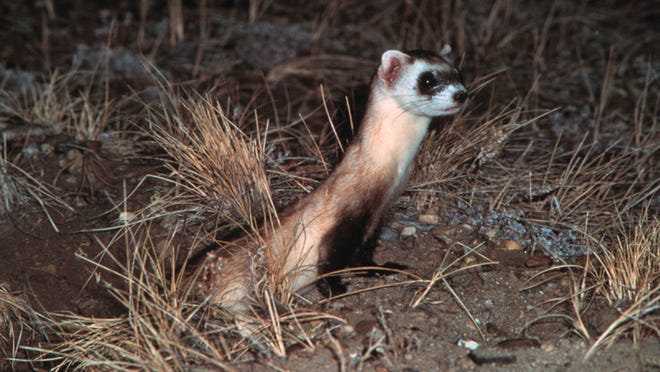Genetic diversity ignored in federal plan to save lobo, lawsuit says
 Adrian Hedden
Adrian Hedden
A lawsuit filed in federal court challenged a recent plan to recover the Mexican gray wolf, known as the lobo in New Mexico, as inadequate to protect the species and prevent its extinction.
Last month, the U.S. Fish and Wildlife Service released a revised recovery plan for the wolf – listed as federally endangered since 1976 – removing a population cap of about 320 wolves living in their experimental habitat area covering parts of southern New Mexico and Arizona.
The agency also planned to increase goals for releasing wolves into the wild, hoping to use a process known as “cross-fostering” that entails sending captive-raised wolves to live in pre-established dens.
This was one contention in the lawsuit filed Tuesday that also alleged the new plan set inadequate population targets and unduly barred the wolf’s recovering population from lands the suit said were “promising” for habitat in the Grand Canyon and southern Rocky Mountains region.

Another complaint was that the plan would consider success in addressing genetic diversity based on the age of the released wolves, not if they breed.
Plaintiffs called on a federal judge to declare the Fish and Wild Service’s plan in violation of the National Environmental Policy Act (NEPA) and set it aside for further revision before the plan takes effect.
Michael Robinson with the Center of Biological Diversity, one of the plaintiff organizations in the case, said increasing genetic diversity was essential to increasing wolf numbers, and the federal government’s lack of adequate policy would threaten the species’ survival.
“Underlying the federal absence of genetic standards is a determination to keep killing wolves and avoid effective wolf releases, all on behalf of the public lands livestock industry,” he said. “Our lawsuit will show how the government refused to be candid about the lethal consequences of its mismanagement.”
There were at least 196 wolves in the wild in 2021, per a report from the Fish and Wildlife Service, and its goal was to see 22 released lobos reach the breeding age, about 2 or 3 years old, by 2030.
They once numbered in the thousands, the suit read, and dwelled across the American West but were systematically killed by the government throughout the 20th Century to protect livestock.
The federal government began reintroducing the wolves in 1998, but were exempted by the Fish and Wildlife Service from important elements of the Endangered Species Act, read the suit, as a “nonessential experimental population.”
“The Service’s attempts to manage the wild Mexican wolf population— through several iterations of a management rule—have been inadequate since they began,” the suit read.
The suit argued that since the wolves released through the years were descendant from a small number of captive lobos, genetic diversity was always a concern.
A lack of genetic diversity among the Mexican gray wolf population was a problem, read the suit, the federal government repeatedly ignored during its efforts to restore the species.

“In particular, FWS has repeatedly failed to follow the best available scientific evidence regarding the measures needed to recover Mexican wolves,” the suit read. “Because all reintroduced wolves descend from a small number of captive individuals, genetic diversity was always a prime concern."
Genetic diversity can increase a species’ potential for survival by allowing it to adapt to a wider array of conditions, like climate change, read a report from the Climate Adaption Science Centers within the U.S. Geological Survey.
“Perhaps one year, one population does well and in another year a different population does well. Over time, they all even out,” the report read. “By having that variation built in, the species minimizes its risk of complete collapse.
“The greater the genetic diversity, the greater the opportunity for resiliency to future climate change.”
Today, most Mexican gray wolves living in the prescribed population area are as genetically similar as first siblings, read the suit, creating health problems and reducing the success of breeding.
“This carries significant threats for the long term viability of the population, as genetically depressed wolves have reduced reproductive success and disease resistance, and suffer from numerous cumulative health problems,” the suit read.
The Fish and Wildlife Service’s wolf recovery rule was remanded in 2018 by a federal court that demanded it be revised, resulting in the new rule published this year.
But the policy still did not go far enough in promoting the species’ regrowth, read the suit, and should be revised again to include management practices that allowed for more diversity and expanded the region they could populate.
“Mexican wolves, ranchers and the public would all benefit from the increased coordination that comes with ‘essential’ status and by allowing wolves back into suitable habitats where there are few opportunities for conflict,” said Craig Miller with Defenders of Wildlife, another plaintiff group.
“Instead, the new rule prevents necessary expansion and confines a single population to an area with much unsuitable habitat and a high likelihood of conflict.”
Following the release of the new plan June 30, Fish and Wildlife Southwest Regional Director Amy Lueders said it would protect the species while balancing the needs of local landowners and the agriculture industry.
“We look forward to continued collaboration with our state, federal and Tribal partners in ensuring the experimental population contributes to long-term conservation and recovery while also minimizing impacts on livestock operators, local communities and other wildlife,” she said in a statement.
Adrian Hedden can be reached at 575-628-5516, achedden@currentargus.com or @AdrianHedden on Twitter.